“In Spite of This Place”
Prison watchdog Keri Blakinger turns inward in Corrections in Ink, a new memoir that documents the “casual cruelty of prisons.”
| July 7, 2022


There’s a moment in the middle of Corrections in Ink, a new memoir by Marshall Project staff writer Keri Blakinger, where she describes why solitary confinement still terrifies her.
It was the spring of 2011 and Blakinger, who had already been jailed for months on drug charges, had just recently been transferred from one county lockup in upstate New York to another because of overcrowding. Guards had isolated Blakinger when she arrived at the new jail, not even as punishment but due to bureaucratic foot-dragging, separating her from others until, on her fourth day in solitary, her old jail finally sent paperwork proving that she’d already been tested for tuberculosis and was cleared for general housing.
“As soon as the door clunked shut behind me, the weight of seclusion hit me like a wall of dark seawater, knocking me off my feet and leaving me gasping for breath,” Blakinger writes about her time in isolation. Other women in jail tried shouting to communicate with her, but she could only hear muffled and nonsensical voices, “like someone had slipped an opaque filter over reality.” She tried journaling but struggled to finish a thought or couldn’t comprehend the words when she tried reading whatever she wrote. She remembers drifting in a “half-awake fugue state, unmoored and incorporeal—like the brain in a vat we used to talk about in philosophy class.”
“I quietly lost my mind to a degree that still terrifies me,” Blakinger writes. “To me, it felt like unraveling, but looking back it also feels like a turning point, a moment at which I began to see how broken the system could be, and how much it could break a person.”
Blakinger’s book, her first, is many things—a vivid page-turner that recounts her descent into addiction, a powerful redemption story, and at times a hilarious and moving portrait of joy and resistance in the face of darkness.
But what connects Blakinger’s memoir to the larger body of journalism that she’s produced since leaving prison is the raging indictment it makes of the American criminal legal system. She details the escalating callousness she encountered while at her most broken and vulnerable, from arrest to jail to prison, from the media that paraded her mugshot on television and the judges who looked at her with disdain to the corrections officers who seemed to revel in inflicting pain and the prison doctors who berated her for seeking treatment behind bars.
Incarceration, Blakinger writes, is a constant lesson in humiliation, until eventually identities are erased and replaced with a number—in her case 11G0845, marking her as the 845th female to enter New York prisons in 2011. She describes officers laughing at women who wept on the bus during transfer from jail to state prison; being weighed and measured and interrogated about tattoos and birthmarks “like specimens” when entering state custody; the guards who searched a woman’s cell and tore through her belongings for hours, claiming they got a tip about contraband while the woman sobbed, only to announce “April Fool’s!” when they found nothing and admitted there was no tip; and other women sent to solitary, supposedly for their protection, after being sexually assaulted by guards.
Later in the book, once she’s locked in state prison, Blakinger describes having another realization, again related to the threat of solitary. She remembers hearing guards chatting about a woman they’d thrown in isolation who, either due to deterioration or defiance or some combination of both, had started defecating on her food tray and sliding it through the slot in her door. In response, the guards had shut off water to the faucet in the woman’s cell, but one of them wondered aloud: What will she drink, won’t she get dehydrated?
“She can drink out of the toilet,” another guard answered. “If it’s good enough for my dog, it’s good enough for her.”
“My head snapped up in shock,” Blakinger writes, “and that is when I realized: Behind bars, there are no rules. Sure, there is a rulebook and there are things you cannot do. But when it matters, no one is watching.”
—
Prisons and jails in the United States, which claims the highest incarceration rate in the world, are largely black boxes. Unlike most other public institutions, and even private ones like banks and mines and zoos, independent oversight of American lockups is a rarity. Horrific conditions and treatment behind bars remain mostly hidden from public view, leaving most sheriffs and wardens to run jails and prisons like fiefdoms with little accountability.
Blakinger’s work since leaving prison in 2012 has been an antidote to that darkness. Her reporting reads like a laundry list of reasons to create more independent oversight of American prisons and jails. After getting out of prison, Blakinger wrote for the Ithaca Times and New York Daily News before joining the Houston Chronicle and eventually taking over the paper’s prison beat, which she revitalized.
I and most other reporters struggling to cover the remarkably closed-off, dysfunctional and combative Texas prison system were awed by her scoops and stories—which largely seemed to stem from intently listening to incarcerated people and their families, taking their concerns seriously and investigating to get to the truth. Her acknowledgements at the end of the book thank “all the prison officials whose lies and insults keep me motivated enough to uncover the truth.”
If Blakinger has made reporting on prisons better in innumerable ways, her work has also initiated more tangible change. The Texas Department of Criminal Justice (TDCJ) started giving out dentures after she reported on the prison system denying them to toothless prisoners. TDCJ tossed hundreds of disciplinary cases against incarcerated people and fired several staffers after she reported on a quota system that pushed guards to make bogus write-ups and even plant contraband in cells. She brought attention to the rise in suicides and atrocious medical care inside Texas prisons. And she helped shame some newsrooms away from wantonly posting people’s mugshots. In late 2019 she became The Marshall Project’s first formerly-incarcerated staff writer, where her reporting continues to break new ground.


In Corrections in Ink, Blakinger turns that investigative lens inward, interrogating the details not just of her own life but also the dehumanizing conditions and treatment she faced in lockup, an origin story of sorts for one of the most acclaimed journalists writing about American prisons today.
She acknowledges that she grew up with all the privilege afforded a white, upper middle-class family with two Ivy League-educated parents, unlike most who enter the belly of America’s carceral beast. As a child she excelled in and out of school, eventually becoming a star figure skater with a daunting training schedule and on track to someday compete in the Olympics. She attended Cornell University before her arrest and incarceration, and finished the degree after prison. Anyone who knows Keri-the-Reporter will see flashes of who she eventually became in the book’s early pages—an indefatigable work ethic, over-organized, and on the edge of chaos.
But Blakinger had demons, at first eating disorders and then drug addiction, and in the book she writes in harrowing detail and with heartbreaking honesty about the hard road she traveled because of them. Blakinger chooses to not blame others for the chain of events that led her to encounter the harsh prison system, but Corrections in Ink speaks volumes about larger dynamics of treatment and punishment in this country. “One time when I was eighteen, a drug counselor told me that if I’d been raped more than once, at some point I was asking for it,” Blakinger writes. “That played to my worst fears, or maybe to my deepest desires for self-loathing. On good nights, I told myself she was wrong. But I still wondered—was there a grain of truth?”
Ever the reporter, in her memoir Blakinger blends self-reflection with data and research about prisons and who ends up there. More than half of women in prison are survivors of physical or sexual violence, roughly three quarters of them struggle with mental illness, and a significant amount of prisoners under the age of 30 have spent time in foster care. Studies show that most people who wind up in prison grew up in poverty, most did not graduate high school, and many are illiterate.
“I knew about the girl who ate glass, the girl who had sex with her sisters, the girl who was so illiterate she could not dial a phone, the girl who grew up in group homes watching her friends get raped,” Blakinger writes. “The whole premise of prison began to seem absurd: Locking hundreds of traumatized and damaged women in together and threatening them constantly with additional punishments is not rehabilitation. It is not corrections. It is not public safety. It is systemic failure.”
Blakinger also describes flashes of solidarity, love, and even genuine happiness, like the time the women around her broke into spontaneous song when Kelly Clarkson’s “Since U Been Gone” came over the radio. “It was as if some cosmic cog had slipped out of place, a celestial shift I would not have fully appreciated a year earlier,” she writes. “This was not just women singing, this was women learning how to steal joy in a place built to prevent it.”
—
Blakinger was writing her memoir during a particularly bleak time in American incarceration. Many public officials across the country, including in Texas where Blakinger lives and often still reports, turned a blind eye to the increased suffering and death behind bars as the pandemic ravaged correctional facilities. “The news sounded so dire, and the news I heard from the inside sounded apocalyptic,” she writes in an epilogue. “Even after everything I had survived, and everything I had reported on, and everything you have read in this book, the first year of the pandemic taught me more about the casual cruelty of prisons than the ten years before it had.”
COVID-19 both exacerbated dangerous and degrading conditions behind bars and also further isolated incarcerated people, in turn making prisons and jails even more opaque. But Blakinger stayed up late into the night, texting with guards, messaging with terrified families of people in prison, and talking to prisoners on contraband phones. She wrote devastating articles about how life in lockup had grown even more miserable—from moldy and inedible food to rivers of sewage and fires that some prisoners began setting to protest the deteriorating conditions.
The emotional toll of such reporting can be heavy, especially for journalists like Blakinger who have personally experienced the grotesque flourishes of American criminal punishment. Early in the pandemic, when reporting on increasing unrest inside Texas prisons due to extended lockdowns, Blakinger wrote about footage she obtained from a contraband cell phone documenting something that prison officials claimed had not happened. In reaction, TDCJ’s communications director, who has since left the agency, threatened to investigate her for “participation in a felony.”
Blakinger told me that the threat made her panic, thinking again of solitary confinement. “I’m always thinking if I get arrested or end up in jail that for some reason I could still end up in solitary.”
I’ve seen prison officials try to undermine Blakinger’s work in other ways. When Texas froze over last February and the power grid collapsed, people locked in prison defecated in paper bags and overflowing toilets while guards passed out half-rations of unidentifiable food. A reporter at the magazine where I worked at the time had obtained video showing snow falling through a broken window in a cell and piling up on the windowsill. Before we published a story with the video, the same prison system spokesman called me and demanded I tell him where it came from, claiming Blakinger had given him such information when reporting on other stories with contraband footage, which I knew was a lie. (The new communications director declined to comment when I asked about the agency’s treatment of Blakinger, saying in an email, “the previous communications director no longer works for the agency”).
Some Texas lawmakers have in recent years cited Blakinger’s reporting to propose independent oversight of the state prison system, but legislation that would do so continues to languish. As people in power in the state largely ignore the compounding crises that Blakinger has helped document behind bars, she likely remains the most effective source of oversight for the Texas prison system. In her book, Blakinger reflects on second chances, and how she was lucky and privileged enough to get one when so many others don’t. Reading Corrections in Ink made me think about how much less we’d know if Blakinger hadn’t been given one.


In the months before she published her book, Blakinger started crowdfunding to send copies to hundreds of people behind bars who wanted to read it. She told me that she had hoped to write the kind of book she was searching for when imprisoned—someone who left prison to become a successful writer. And for people who haven’t experienced the criminal legal system, she hopes that the book humanizes incarcerated people and helps explain why so many do not succeed after release. “The people who don’t succeed after prison, it does not mean they’re bad people,” Blakinger told me. “It means the prison system put a lot of obstacles in their way.”
In the memoir, Blakinger writes about a new prisoner asking her for pointers on surviving just as she was about to leave lockup. Blakinger told the woman she survived “in spite of this place, not because of it.” Her advice captures the false promise of rehabilitation in American prisons.
“It’s like some of the tools you need to survive time in here are the tools you needed to survive life out there,” she recalls telling the new prisoner. “And if you had them, you probably wouldn’t be here in the first place. But now that you’re here, it’s just harder to find them.”




